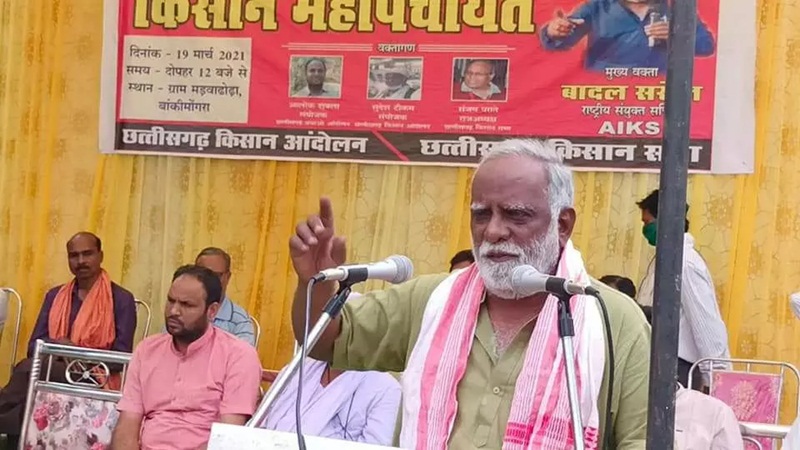Chhattisgarh: Adivasi groups kick off public meetings in Bastar in solidarity with the farmers’ protests
Four months after the farmers’ protests began around the national capital’s borders, the stir has found support from Chhattisgarh’s Adivasi organisations. Adivasi leaders allege that if the corporates are allowed to function freely in the agriculture sector, farming will witness the same plight as that of Chhattisgarh’s forests.

The Adivasi leaders demand repealing of the three laws along with a legal guarantee of the minimum support price (MSP). (Photo by arrangement)
The farmers’ protests have found their latest ally amongst the Adivasi organisations in the tribal state of Chhattisgarh. For the past few days, various farmers’ meetings have been organised in the state to show solidarity with the farmers of Punjab, Haryana and Uttar Pradesh who are protesting against the three farm laws passed in September, last year.
The Adivasi leaders demand repealing of the three laws along with a legal guarantee of the minimum support price (MSP). On March 15, Bastar became the first district to witness public meetings that were led by Adivasi leaders and exhibited solidarity with the farmers’ stir that has been continuing for the last 126 days around New Delhi.
“The harmful effects of the farm laws will be felt by farmers across India. Although the farmers in Chhattisgarh are selling their produce at MSP but after the introduction of these laws, there shall be no guarantee that their produce will continue to be sold at MSP in open markets. This is why we are protesting against the farm laws,” Sanjay Parate, state convenor, Chhattisgarh Kisan Andolan told Gaon Connection.
Also Read: Two out of five farmers fear the farm laws will end the MSP system; 59% want MSP as a mandatory law
After the maiden farmers’ meet in Bastar’s Darbha, such meetings sprang up in various districts across Chhattisgarh — on March 18, public meetings were held in Jashpur district and on the following day, Adivasi farmers meetings were organised in Korba district as well.
Gaon Connection talked to a farmer from the Korba district who reasoned as to why the farmers’ protests took four months to find active support from the farmers and Adivasis in Chhattisgarh. “The farmers in the state are not well off and lacked the basic information about the farm laws that were passed last year. Hence it took time for farmers to know what’s happening around Delhi,” Jawahar Singh Kanwar told Gaon Connection.
“Small panchayats (meetings) will be organised to inform farmers about these farm laws. It is only after these small meetings that a big rally will be launched in the state,” he added.
There are also plans for launching awareness campaigns that shall include not just farmers but also people from an array of occupations.
“In the coming days districts like Raipur, Rajnandgaon, Dhamtari and Balaud will witness farmers meetings at a much larger scale. Labourers, students, small traders and service sector employees will be asked to join these meetings. We aim to include common people in our movement,” Teekam, convenor of Chhattisgarh Kisan Andolan told Gaon Connection.
‘Bastar prime example of corporate loot’
All India Kisan Sabha’s joint chairperson Badal Saroj opineed that whenever the corporate sector is allowed a free access to natural resources and primary activities like agriculture, havoc is wreaked on the common people of the country.
“People in Bastar have first-hand experience of how corporate greed is detrimental for the citizens. The mainstream politics in the state does not want the people’s voice to be represented so they are resentful of our kisaan panchayats (farmers’ meetings). So, it is challenging to organise these meetings,” Saroj said.
Apart from Saroj, representatives of political groups in the state like Gondwana Democratic Party’s Nandkishor Raj and Chhattisgarh Bachao Andolan’s Alok Shukla and various other local leaders are joining ranks to hold these panchayats.
One such leader, Soni Sori told Gaon Connection that Bastar’s struggle is actually people’s struggle against corporate loot which is being allowed by the government.
“The farmers’ protests are about safeguarding future generations. We, the farmers in Bastar are against these farm laws because we know that if these private players are allowed to do at a national level, what they did in Bastar, the same will happen in other states like Uttar Pradesh, Haryana and Punjab,” she said.
Also Read: Only half the farmers aware of the Centre’s new contract farming law: Gaon Connection Survey
‘Distance a major factor behind Chhattisgarh farmers’ absence at Delhi’s borders’
Chhattisgarh Kisan Andolan’s Sanjay Parate told Gaon Connection that as a result of Chhattisgarh’s significant distance from New Delhi, state’s farmers find it difficult to protest at the national capital’s borders.
“States like Punjab, Haryana, Uttar Pradesh and Rajasthan are closer to Delhi. That’s why farmers from these states are being seen at the protest sites close to the national capital,” he said.
Also Read: Every second respondent farmer in the west zone supports the new agri-laws: Gaon Connection Survey

